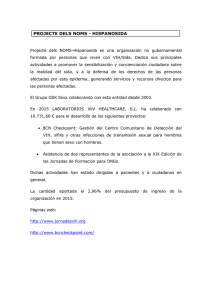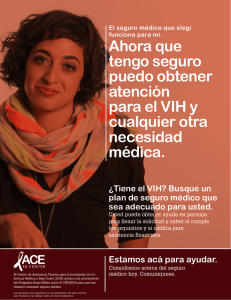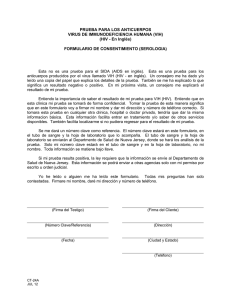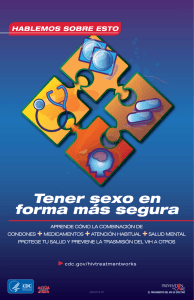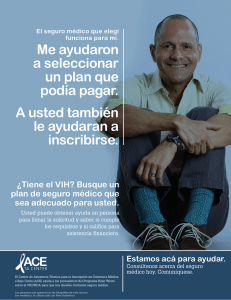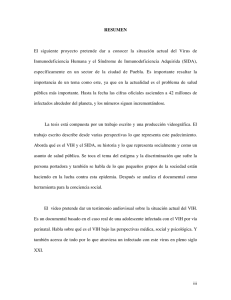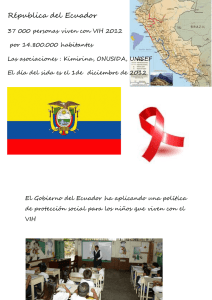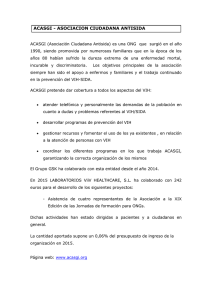Projecte dels NOMS
Anuncio
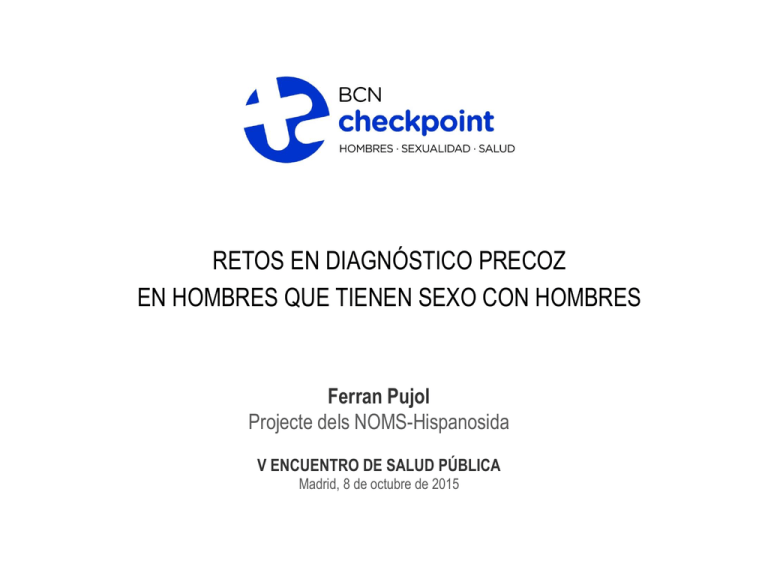
RETOS EN DIAGNÓSTICO PRECOZ EN HOMBRES QUE TIENEN SEXO CON HOMBRES Ferran Pujol Projecte dels NOMS-Hispanosida V ENCUENTRO DE SALUD PÚBLICA Madrid, 8 de octubre de 2015 “Men who have sex with men (MSM) are the only key population in the countries of the European Union and European Economic Area that has not seen a decline in new HIV infections during the last decade.” “Sex between men is still the predominant mode of HIV transmission (42%) in the EU/EEA and reported cases among MSM have increased by 33% compared to 2004.” Preventing HIV and STI among men who have sex with men – an ECDC guidance 17 July 2015 LA COHORTE BARCELONA CHECKPOINT (January 2009 – December 2014) 9.780 participants - 5.430 persons with follow-up visit 306 infections HIV Incidence HIV: 2,51 x 100 persons/year (95% CI: 2,25 – 2,81) General population: incidence = 0,02% ¿QUÉ ESTÁ IMPULSANDO LA EPIDEMIA DE VIH ENTRE LOS HSH? 1. Los riesgos a nivel individual • • Riesgos biológicos (sexo anal vs. vaginal, versatilidad) Riesgos conductuales (no un mayor riesgo, sino parejas provenientes de un entorno con alta prevalencia, sexo sin condón con la pareja estable, rol de las ITS) 2. Riesgos a nivel de redes • Tamaño y densidad de las redes en las que tienen lugar los encuentros sexuales 3. Riesgos estructurales • Criminalización del VIH, estigma, homofobia, homonegatividad, discriminación en el sistema sanitario, heteronormatividad Fuente: Beyrer, Baral, van Griensven, Goodreau, Chariyalertsak, Wirtz, Brookmeyer, The Lancet, 2012 Global Estimates (2014-15) vs the Gap to reach 90-90-90 Targets 100% 80% 36.9 million ¡Podríamos perder los objetivos sin un incremento de los diagnósticos y sin una reducción de nuevas infecciones! Breakpoint 1: 13.4 million Undiagnosed 53% 60% 19.8 million 40% 20% Breakpoint 2: 14.9 million not treated 41% 15.0 million Breakpoint 3: 15.3 million Not Virally Supressed 32%* 11.6* million 0% HIV Positive People Diagnosed On ART Viral Suppression <1000 (ITT)* Ref: On ART = March 2015. How Aids Changed Everything. Fact Sheet. UNAIDS 2015. MDG 6: 15 YEARS, 15 LESSONS OF HOPE FROM THE AIDS RESPONSE July 2015. * Average viral suppression% Intention to Treat LMIC rate from a Systematic Review by McMahon J. et al. Viral suppression after 12 months of antiretroviral therapy in low-and middle-income countries: a systematic review." Bulletin of the World Health Organization 91.5 (2013): 377-385. “In some European countries, community-based projects providing professional services and peer support (by gay men for gay men) have had success in achieving high client satisfaction, thereby ensuring better uptake, follow-up and compliance. Examples of this include community-based HIV testing „checkpoints‟ in Barcelona and elsewhere throughout Europe.” Preventing HIV and STI among men who have sex with men – an ECDC guidance 17 July 2015 • Projecte dels NOMS-Hispanosida instauró en 2004 el 20 d‟Octubre como el Día de la Prueba del VIH que con el tiempo ha dado origen a la Semana Europea de la Prueba del VIH • BCN Checkpoint fue creado en 2006 por la ONG Projecte dels NOMS-Hispanosida • BCN Checkpoint introdujo el uso de las pruebas rápidas del VIH en centros comunitarios en España • El modelo de intervención comunitaria en diagnóstico del VIH en HSH desarrollado por BCN Checkpoint está recomendado por la OMS y el ECDC y se ha replicado en diversos países de toda Europa RESULTADOS E IMPACTO DE BCN CHECKPOINT EN DIAGNÒSTICOS DE VIH EN CATALUNYA 2007 2008 2009 2010 2011 2012 2013 2014 1. Pruebas 1.065 1.228 2.485 3.425 3.837 5.051 5.062 6.133 2. Personas 903 1.124 2.201 2.896 3.198 4.049 4.030 4.761 3. Casos positivos 37 72 113 126 132 138 138 142 322 310 303 385 411 471 473 341 11,5% 23,2% 37,3% 32,7% 32,1% 29,3% 29,2% 41,6% 4. Total casos VIH en HSH reportados en Cataluña* 5. % de casos detectados en BCN Checkpoint * Fuente: CEEISCAT a 31/12/2014 (Fecha publicación Web 15/09/2015) Número de pruebas rápidas reactivas (2007-2012) Castilla y León: 23 - Farmacias: 100% País Vasco: 129 – Farmacias: 67% – Bizkaisida: 15% – Sidálava: 18% Cataluña: 878 - BCN Checkpoint: 71% Madrid: 292 - Madrid +: 57% - Cogam: 22% - Triángulo: 11% - Apoyo +: 10% - P. de saunas: 17% - P. ASPB: 4% - Farmacias: 8 % Baleares: 18 - Alas: 100% Andalucía: 195 - Conjunto ≈30 ONGs: 100% Valencia: 44 - Lambda: 100% “Hay programas de pruebas rápidas en entornos no clínicos, como el BCN Checkpoint, que ha demostrado capacidad para ser una alternativa diagnóstica predominante en los HSH” EN 2014 EL 37% DE LOS CASOS FUE DIAGNOSTICADO EN MENOS DE 6 MESES DESDE LA INFECCIÓN Total VIH confirmados 142 (100%) Prueba VIH- anterior 135 (95,1%) Fecha registrada última prueba VIH negativa 123 (91,1%)* Última prueba Núm. % Núm. Acum. < 6 meses 46 37,4% 46 37,4% 6 ≤ meses < 12 33 26,8% 79 64,2% ≥ 12 meses 44 35,8% 123 100,0% Total 123 100,0% % Acum. * Prueba anterior en el centro: 27,6%; Autodeclaración: 72,4% RESULTADOS BCN CHECKPOINT (2006-2014) Más de Más de Solamente 28.500 900 2% pruebas realizadas casos de VIH diagnosticados casos sin derivación sanitaria RETO 1: INCREMENTAR LA FRECUENCIA DE LA PRUEBA EN HSH Cost-effectiveness of Frequent HIV Testing of High Risk Populations in the United States. Hutchinson, Angela B. PhD, MPH; Farnham, Paul G. PhD; Sansom, Stephanie L. PhD, MPP, MPH; Yaylali, Emine PhD; Mermin, Jonathan H. MD J Acquir Immune Defic Syndr. 2015 Sep 8. RESULTS: For MSM, HIV testing was cost-saving or cost-effective over a 1-year time period for both 6-month compared to annual testing, and quarterly compared to 6-month testing using either test. Testing IDU every 6 months compared to annually was moderately cost-effective over a 1-year time period with a fourth-generation test, while testing with rapid, point-of care tests or quarterly was not cost-effective. MSM results remained robust in sensitivity analysis, while IDU results were sensitive to changes in HIV incidence and continuum-of-care parameters. Threshold analyses on costs suggested additional implementation costs could be incurred for more frequent testing for MSM while remaining cost-effective. CONCLUSION: HIV testing of MSM as frequently as quarterly is cost-effective compared to annual testing, but testing IDU more frequently than annually is generally not cost-effective. RETO 2: DIAGNOSTICAR LAS INFECCIONES EN FASE AGUDA GeneXpert® Testing in Non-Lab Setting Fácil de usar Para entornos con poca o ninguna estructura de laboratorio Accesible para el usuario RESULTADOS ESTUDIO DIAGNÓSTICO INFECCIONES AGUDAS Con test rápido negativo y los siguientes criterios: • • • • No uso consistente del condón durante el último mes > 10 parejas ocasionales y/o ITS durante últimos 6 meses Pareja con diagnóstico reciente de VIH Síntomas de infección aguda Periodo: 21 de abril – 1 de octubre Total de pruebas realizadas: 742 Total infecciones agudas detectadas: 6 Visita hospital: en menos de 3 días Carga viral: > 10 millones de copias Inicio de tratamiento: el mismo día de la visita (< 3 días) Tiempo estimado de infección: entre 10 y 24 días RETO 3: DETECCIÓN Y TRATAMIENTO DE ITS Prevalence study of asymptomatic STI among Men who have Sex with Men (MSM) in a nonclinical setting in Barcelona • De las 479 muestras analizadas, 103 fueron diagnosticadas con CT o NG (21,5%) • El 100% de los casos detectados recibieron tratamiento RETO 4: REDUCCIÓN DE NUEVAS INFECCIONES: ¡INCLUIR LA PREP! CATALUNYA PRESENTA UN PLAN DE ACCIÓN ESPECÍFICO PARA HACER FRENTE A LA EPIDEMIA DEL VIH EN LOS HSH Aumentar el número de pruebas de detección del VIH y la frecuencia de las mismas Diagnosticar los nuevos casos en fase aguda El tratamiento como prevención Cribado y tratamiento del resto de ITS Implementación de la Profilaxis Pre-exposición (PrEP) AGRADECIMIENTOS Michael Meulbroek Jorge Saz Félix Pérez Albert Dalmau-Bueno Héctor Taboada Giovanni Marazzi Alberto Pérez Antonio Carrillo Antonio Cabas Emili Aldabó Francesc Soler Antonio Gata Brian Roldán Pep Coll
